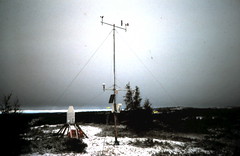Current Geology News
Although it is easy to get caught up in our own minuscule worlds, with our jobs, our own stresses, it's best to sometimes take a few moments to look at what's going on with the rest of the world. Researching current geology news is a good way to keep abreast of these occurrences.
On October 6th, a sizeable (few meters) asteroid was discovered before entering the earth's atmosphere. Generally, asteroids this large enter the earth's atmosphere once every few months, but this was the very first time the asteroid had been discovered prior to impact. Colliding with the atmosphere above Sudan, Africa, it entered at a 19-degree angle and was imaginable to look like a "fireball." Due to its size, it was not supposed to leave any mammoth fragments behind.
On October 5th, a 6.6 magnitude earthquake struck Karakul, Tajikistan, where at least 72 population were killed. Dozens of buildings were destroyed. This quake was also felt in areas in China, Pakistan and Uzbekistan.
Still more current geology news, a new technique using solitaire dust may soon be used to help chemotherapy patients. The actual patch looks a bit like saran wrap but is embedded with tiny bits of diamonds that would be able to release drugs over a duration of time. This would considerably limit the exposure to the chemotherapy drugs thereby lessening the side effects. Study has confirmed these "nanodrugs" as they're called do not cause inflammation within the body's cells.
Oil found (back in the 1980's) off the Atlantic coastline is not at this time being tapped. Why not? When America gets 60% of its oil from other countries (most of whom despise America) why then is America not getting oil from off the coastline of Virginia? It was estimated in the 1980's that there is at least a 6-month provide of oil there. Because of the long and drawn out permit process, Drilling would not start there for at least another decade. This Drilling would originate new jobs as well as allow America to become stronger and less dependent on foreign nations.
Sure, salt makes us thirsty. And the existence of excess salt in the Great Salt Lake is apparently drying it up. The lake is nearing near record-low levels, bottom since the 1960's, the experts say. It's at least six feet below general levels. The Lake is a complete entity, no water feeds it, and its levels are therefore dependent on many other factors, rates of evaporation, soil moisture, rain. Low lake levels means a less ideal environment for both boaters and for fisherman, especially those catching brine shrimp.
And more in current geology news, there was a landslide on Mars. Agreeing to the Mars Odyssey Mission Themis (Thermal Emission Imaging System), it captured a landslide inside an as of yet unnamed crater in Terra Cimmeria.
But I don't think the Spiess house is too worried about the landslide on Mars when a landslide in their backyard is about to take their home away. Due to heavy rains, the Spiess house have already lost half of their backyard. In mid September, half of their backyard fell away in just seven hours. They have discovered cracks throughout the foundation of the house, and it is now even pitching the driveway. Many guarnatee companies, it is reported, do not cover damages caused by earth Movement.


Comments
Post a Comment